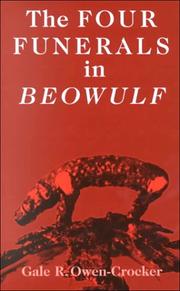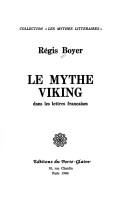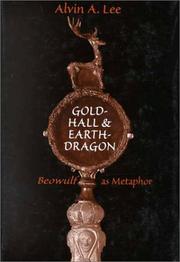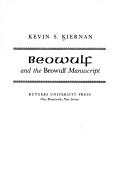| Listing 1 - 6 of 6 |
Sort by
|

ISBN: 0719054974 Year: 2000 Publisher: Manchester New York Manchester University Press : Distributed in the USA by St. Martin's Press
Abstract | Keywords | Export | Availability | Bookmark
 Loading...
Loading...Choose an application
- Reference Manager
- EndNote
- RefWorks (Direct export to RefWorks)
Beowulf --- Funeral rites and ceremonies in literature --- Civilization [Anglo-Saxon ] in literature --- Scandinavia in literature --- Heroes in literature --- Rhetoric [Medieval ] --- Funeral rites and ceremonies - Scandinavia - History - To 1500. --- Funeral rites and ceremonies - England - History - To 1500. --- Scandinavia - In literature.
Book
ISBN: 9781138820869 9781315743622 9781317589679 9781317589686 Year: 2015 Publisher: New York ; London : Routledge,
Abstract | Keywords | Export | Availability | Bookmark
 Loading...
Loading...Choose an application
- Reference Manager
- EndNote
- RefWorks (Direct export to RefWorks)
"This book examines the sustained interest in legends of the pagan and peripheral North, tracing and analyzing the use of an 'out-of-Scandinavia' legend (Scandinavia as an ancestral homeland) in a wide range of medieval texts from all over Europe, with a focus on the Anglo-Saxon tradition. The pagan North was an imaginative region, which attracted a number of conflicting interpretations. To Christian Europe, the pagan North was an abject Other, but it also symbolized a place from which ancestral strength and energy derived. Rix maps how these discourses informed 'national' legends of ancestral origins, showing how an 'out-of-Scandinavia' legend can be found in works by several familiar writers including Jordanes, Bede, 'Fredegar', Paul the Deacon, Freculph, and Æthelweard. The book investigates how legends of northern warriors were first created in classical texts and since re-calibrated to fit different medieval understandings of identity and ethnicity. Among other things, the 'out-of-Scandinavia' tale was exploited to promote a legacy of 'barbarian' vigor that could withstand the negative cultural effects of Roman civilization. This volume employs a variety of perspectives cutting across the disciplines of poetry, history, rhetoric, linguistics, and archaeology. After years of intense critical interest in medieval attitudes towards the classical world, Africa, and the East, this first book-length study of 'the North' will inspire new debates and repositionings in medieval studies"--
Literature, Medieval --- Legends --- Scandinavia in literature --- Littérature médiévale --- Légendes --- Scandinavie dans la littérature --- History and criticism. --- Histoire et critique --- Europe, Northern --- Europe septentrionale --- Literatures --- Littératures
Book
ISBN: 0713161477 0713161485 9780713161489 Year: 1978 Volume: 70 Publisher: London Arnold
Abstract | Keywords | Export | Availability | Bookmark
 Loading...
Loading...Choose an application
- Reference Manager
- EndNote
- RefWorks (Direct export to RefWorks)
Beowulf was the product of a society almost as remote as the warworld culture it celebrates. This study shows that it is both essential and possible to accept the radically unfamiliar social scene of the poem and to recognize the gulf between its assumptions and our own. The poet's acceptance of rituamized drunkenness, which has led translators into decorous paraphrase, and his evident glorification of violence are only two of the most obvious examples of the difficulties in understanding Beowulf. Mr Shippey confronts such alen attitudes and gives a reading of the poem which follows Anglo-Saxon notions of 'symbolism', 'irony' and 'poetry' rather than their anachronistic modern counterparts
Poetry --- Old English literature --- Beowulf --- anno 1000-1099 --- Epic poetry, English (Old) --- Poésie épique anglaise --- History and criticism --- Vieil anglais --- Histoire et critique --- Dragons in literature --- Heroes in literature --- Scandinavia --- In literature --- Poésie épique anglaise --- Beowulf. --- Epic poetry, English (Old) - History and criticism --- Scandinavia - In literature

ISBN: 2906468002 Year: 1986 Publisher: Paris : Editions du Porte-Glaive,
Abstract | Keywords | Export | Availability | Bookmark
 Loading...
Loading...Choose an application
- Reference Manager
- EndNote
- RefWorks (Direct export to RefWorks)
French literature --- Vikings in literature --- Myth in literature --- Scandinavia in literature --- Mythology, Norse, in literature --- Littérature française --- Vikings dans la littérature --- Mythe dans la littérature --- Scandinavie dans la littérature --- Mythologie nordique dans la littérature --- History and criticism --- Scandinavian influences. --- Histoire et critique --- Influence scandinave

ISBN: 080204378X 1442613122 9786612028755 1282028758 1442675403 9781442675407 9781282028753 9780802043788 Year: 1998 Publisher: Toronto
Abstract | Keywords | Export | Availability | Bookmark
 Loading...
Loading...Choose an application
- Reference Manager
- EndNote
- RefWorks (Direct export to RefWorks)
The aim of Gold-Hall and Earth -Dragon is to re-create as fully as possible for modern readers the original force of the poetic language of Beowulf. Lee makes use of a wide, archetypal literary context for Beowulf to provide illuminating parallels and contrasts with poems and fictions from other times and places. He demonstrates how the poem's symbolic system reveals itself through the metaphorical workings of the Old English words, patterns of imagery, and more general narrative structures, and how the poem might have been experienced and interpreted by the Anglo-Saxons in the light of other Old English poems. The critical tools that Lee uses - combining certain techniques of New Criticism and close reading with postmodern theories of the self-referentiality of language and with Northrop Frye's conceptions of structure and polysemy in literature - make possible a fresh new account of Beowulf as a work that is very much alive in its poetic language, a finely wrought symbolic work of imagining, still resonant with meanings old and new.
Epic poetry, English (Old) --- English language --- Scandinavia in literature. --- Civilization, Anglo-Saxon. --- Monsters in literature. --- Dragons in literature. --- Heroes in literature. --- Rhetoric, Medieval. --- Metaphor. --- Poésie épique anglaise --- Anglais (Langue) --- Scandinavie dans la littérature --- Civilisation anglo-saxonne --- Monstres dans la littérature --- Dragons dans la littérature --- Héros dans la littérature --- Rhétorique médiévale --- Métaphore --- History and criticism. --- Vieil anglais --- Histoire et critique --- Beowulf. --- Parabole --- Anglo-Saxon civilization --- Anglo-Saxons --- Lexicology. --- Style. --- Civilization --- Bjowulf --- Scandinavia --- In literature. --- Figures of speech --- Reification --- Germanic languages --- Poésie épique anglaise --- Scandinavie dans la littérature --- Monstres dans la littérature --- Dragons dans la littérature --- Héros dans la littérature --- Rhétorique médiévale --- Métaphore

ISBN: 0813509254 9780813509259 Year: 1984 Publisher: New Jersey Rutgers university press
Abstract | Keywords | Export | Availability | Bookmark
 Loading...
Loading...Choose an application
- Reference Manager
- EndNote
- RefWorks (Direct export to RefWorks)
Epic poetry, English (Old) --- Manuscripts, Medieval --- Manuscripts, English (Old) --- Monsters in literature. --- Dragons in literature. --- Paleography, English. --- Heroes in literature. --- Manuscript dating. --- Criticism, Textual. --- Editing. --- British Library. --- Beowulf. --- Beowulf --- Nowell codex. --- Manuscripts. --- Scandinavia --- In literature. --- Dragons in literature --- Heroes in literature --- Manuscript dating --- Monsters in literature --- Paleography, English --- English paleography --- Anglo-Saxon manuscripts --- English manuscripts, Old --- Manuscripts, Anglo-Saxon --- Manuscripts, Old English --- Old English manuscripts --- Dating of manuscripts --- Manuscripts --- Anglo-Saxon epic poetry --- English epic poetry, Old --- Epic poetry, Anglo-Saxon --- Old English epic poetry --- English poetry --- Criticism, Textual --- Editing --- British Museum. --- De rebus in Oriente mirabilibus. --- Epistola Alexandri ad Aristotelem de miraculis Indiae. --- Vita Sancti Christophori. --- Judith (Anglo-Saxon poem). --- Bjowulf --- British Library --- In literature --- Beowulf manuscript (Nowell codex) --- Códice Nowell --- Codex Nowell --- British Museum --- Epic poetry, English (Old) - Criticism, Textual --- Manuscripts, Medieval - England - Editing --- Manuscripts, English (Old) - Editing --- Scandinavia - In literature
| Listing 1 - 6 of 6 |
Sort by
|

 Search
Search Feedback
Feedback About UniCat
About UniCat  Help
Help News
News